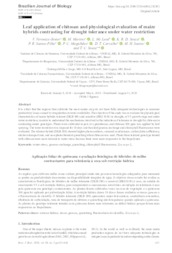Leaf application of chitosan and physiological evaluation of maize hybrids contrasting for drought tolerance under water restriction.
Leaf application of chitosan and physiological evaluation of maize hybrids contrasting for drought tolerance under water restriction.
Author(s): VERONEZE JÚNIOR, V.; MARTINS, M.; MC LEOD, L.; SOUZA, K. R. D.; SANTOS FILHO, P. R.; MAGALHAES, P. C.; CARVALHO, D. T.; SANTOS, M. H.; SOUZA, T. C.
Summary: It is a fact that the regions that cultivate the most maize crop do not have fully adequate technologies to measure productivity losses caused by irregularities in water availability. The objective of this study was to evaluate the physiological characteristics of maize hybrids tolerant (DKB 390) and sensitive (BRS 1030) to drought, at V5 growth stage and under water restriction, in order to understand the mechanisms involved in the induction of tolerance to drought by chitosan in contrasting maize genotypes. Plants were cultivated in pots at a greenhouse, and chitosan 100 ppm was applied by leaf spraying. The water restriction was imposed for 10 days and then leaf gaseous exchange and chlorophyll fluorescence were evaluated. The tolerant hybrid (DKB 390) showed higher photosynthesis, stomatal conductance, carboxylation efficiency, electron transport rate, and non-photochemical quenching when chitosan was used. Plants from tolerant genotype treated with chitosan were more tolerant to water stress because there were more responsive to the biopolymer.
Publication year: 2020
Types of publication: Journal article
Unit: Embrapa Maize & Sorghum
Keywords: Estresse hídrico, Fluorescência da clorofila, Troca gasosa, Têmpera, Zea Mays
Observation
Some of Embrapa's publications are published as ePub files. To read them, use or download one of the following free software options to your computer or mobile device. Android: Google Play Books; IOS: iBooks; Windows and Linux: Calibre.
Access other publications
Access the Agricultural Research Database (BDPA) to consult Embrapa's full library collection and records.
Visit Embrapa Bookstore to purchase books and other publications sold by Embrapa.

